
Eucalyptus dives, commonly known as the broad-leaved peppermint or blue peppermint, is a species of tree that is endemic to south-eastern Australia. It has rough, finely fibrous bark on the trunk and larger branches, smooth bark above, lance-shaped or curved adult leaves, flower buds in groups of eleven or more, white flowers and cup-shaped, hemispherical or conical fruit.
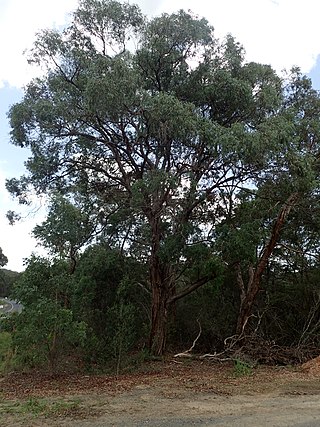
Eucalyptus acaciiformis, commonly known as wattle-leaved peppermint is a tree growing to about 20 metres (66 ft) in height that is endemic to the Northern Tablelands of New South Wales. It has rough, fibrous bark, lance-shaped leaves, white flowers and cup-shaped to bell-shaped fruit. It grows in poor shallow soil, on ridges and slopes.
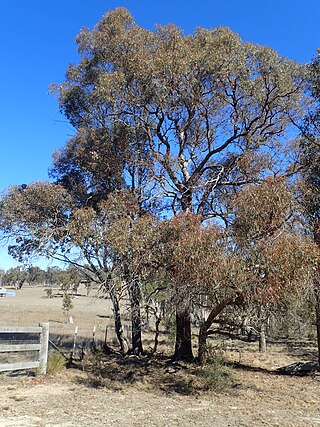
Eucalyptus nicholii, commonly known as the narrow-leaved black peppermint or willow peppermint, is a species of small to medium-sized tree that is endemic to New South Wales. It has thick, rough, fibrous bark on the trunk and branches, small, narrow adult leaves, flower buds arranged in groups of seven, white flowers and small, hemispherical, bell-shaped or conical fruit.
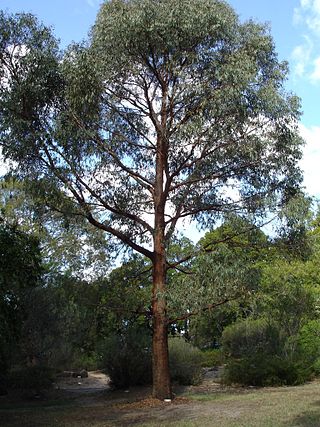
Eucalyptus radiata, commonly known as the narrow-leaved peppermint or Forth River peppermint, is a species of tree that is endemic to south-eastern Australia. It has rough, fibrous to flaky bark on the trunk and larger branches, smooth grey bark on the thinner branches, lance-shaped to curved or almost linear leaves, flower buds in groups of eleven to twenty or more, white flowers and cup-shaped, hemispherical or shortened spherical fruit.

Eucalyptus rubida, commonly known as candlebark, ribbon gum or white gum, is a species of small to medium-sized tree that is endemic to south-eastern Australia. It has smooth bark, sometimes with rough bark at the base, lance-shaped or curved adult leaves, flower buds in groups of three, white flowers and cup-shaped, hemispherical or bell-shaped fruit.

Eucalyptus woollsiana is a species of tree that is endemic to eastern Australia. It has rough, fibrous bark on the trunk, smooth bark above, lance-shaped adult leaves, flower buds in groups of five or seven, white flowers and cup-shaped fruit.

Eucalyptus smithii, commonly known as the gully gum, gully peppermint, blackbutt peppermint, or ironbark peppermint, is a species of medium-sized to tall tree, sometimes a mallee, that is endemic to southeastern Australia. It has rough, compact bark on the trunk, smooth ribbony bark above, narrow lance-shaped adult leaves, flower buds in groups of seven, white flowers and cup-shaped, bell-shaped or hemispherical fruit.

Eucalyptus viridis, commonly known as the green mallee, is a species of mallee or small tree that is endemic to south-eastern, continental Australia. It has rough fibrous or flaky bark on the lower trunk, smooth bark above, linear to narrow lance-shaped adult leaves, flower buds in groups of seven or nine, white flowers and cup-shaped fruit.
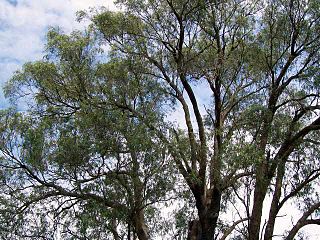
Eucalyptus macarthurii, commonly known as the Camden woollybutt or Paddy's river box, is a species of medium-sized tree that is endemic to a small area of New South Wales. It has rough, fibrous bark on the trunk and larger branches, smooth above, narrow lance-shaped to curved adult leaves, flower buds in groups of seven, white flowers and small conical to bell-shaped fruit.
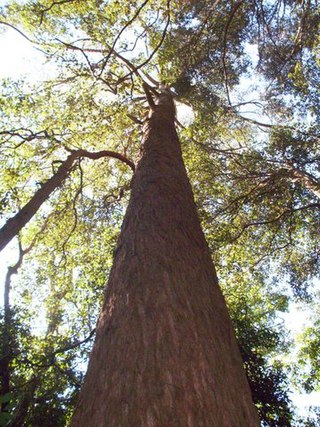
Eucalyptus fastigata, commonly known as brown barrel or cut-tail, is a species of medium-sized to tall tree that is endemic to southeastern Australia. It has fibrous or stringy bark on the trunk and larger branches, smooth bark above, lance-shaped to curved adult leaves, flower buds in groups of eleven or more, white flowers and conical or pair-shaped fruit.
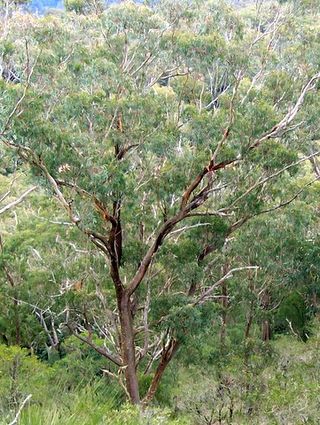
Eucalyptus campanulata, commonly known as the New England blackbutt, gum-topped peppermint or New England ash, is a tree that is endemic to eastern Australia. It has rough, finely fibrous greyish bark on the trunk and larger branches, lance-shaped to curved adult leaves, flower buds arranged in groups of between eleven and fifteen, white flowers and cup-shaped to conical fruit.
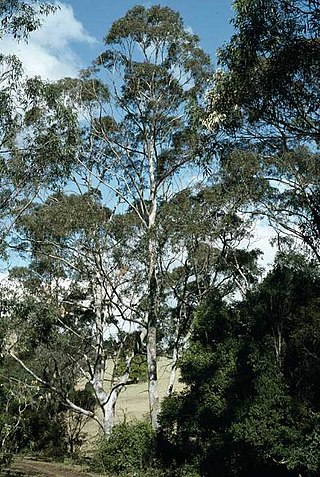
Eucalyptus quadrangulata, commonly known as the white-topped box or coast white box, is a species of small to medium-sized tree that is endemic to eastern Australia. It has rough, fibrous or flaky bark on the trunk and branches, lance-shaped to curved adult leaves, flower buds in groups of seven, white flowers and conical fruit.

Eucalyptus conica, commonly known as fuzzy box, is a species of tree endemic to eastern Australia. It has rough, flaky bark on the trunk and larger branches, smooth above, lance-shaped adult leaves, oval to diamond-shaped flower buds mostly arranged on a branching inflorescence on the ends of the branchlets, white flowers and conical fruit.
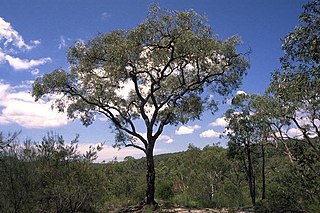
Eucalyptus squamosa, commonly known as scaly bark, is a species of small to medium-sized tree that is endemic to the Sydney region in New South Wales. It has rough, tessellated, fibrous or flaky bark, lance-shaped or curved adult leaves, flower buds in groups of seven, nine or eleven, white flowers and cup-shaped or hemispherical fruit.

Eucalyptus consideniana, commonly known as yertchuk, is a species of plant in the myrtle family and is endemic to south-eastern Australia. It is a tree with rough, fibrous, sometimes prickly bark on the trunk and larger branches, smooth grey bark above, lance-shaped or curved adult leaves, flower buds in groups of between eleven and nineteen, white flowers and conical to hemispherical fruit.
Eucalyptus croajingolensis, commonly known as the East Gippsland peppermint or Gippsland peppermint, is a species of tree that is endemic to southeastern Australia. It has rough, short-fibrous bark on the trunk and larger branches, sometimes smooth bark on the thinner branches, lance-shaped to curved adult leaves, flower buds in groups of nine or more, white flowers and hemispherical to cup-shaped fruit.

Eucalyptus dunnii, commonly known as Dunn's white gum or simply white gum, is a species of medium-sized to tall tree that is endemic to eastern Australia. It has rough bark near the base, smooth white to cream-coloured bark above, lance-shaped to curved adult leaves, flower buds in groups of seven, white flowers and cup-shaped, conical or hemispherical fruit.

Eucalyptus exserta, commonly known as Queensland peppermint, peppermint, bendo, yellow messmate or messmate, is a species of tree or a mallee and is endemic to eastern Australia. It has hard, fibrous bark, lance-shaped adult leaves, flower buds in groups of seven, white flowers and hemispherical or cup-shaped fruit.

Eucalyptus morrisii, commonly known as grey mallee, is a species of mallee or straggly tree that is endemic to western New South Wales. It has rough, fibrous or flaky bark on some or all of the trunk, smooth greyish bark above, lance-shaped adult leaves, flower buds usually in groups of three, white flowers and conical or hemispherical fruit.

Eucalyptus rudderi, or Rudder's box, is a species of tree that is endemic to northern New South Wales. It has rough fibrous or flaky bark on the trunk and branches, lance-shaped adult leaves, flower buds in groups of seven, white flowers and barrel-shaped or hemispherical fruit.





















